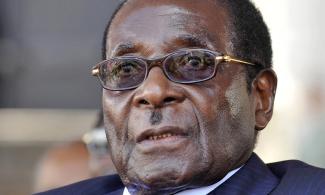
However, unlike Mandela, Mugabe was not democratic. When he was finally elected president, his authoritarian disposition became magnified with power.

Since Robert Mugabe died, critics and friends of the former President of Zimbabwe have been torn between reconciling the man, who fought for Africa’s freedom and the despot that held on to power since Zimbabwe’s independence in 1980 to 2017.
Until 2017, when Mugabe was ousted by his disgruntled military in an insurrection that the Zimbabwe Defence Forces denied was a coup, Mugabe was always the cleverest man in the room. His intelligence was superlative; Mugabe knew this and used it artfully as a political tool and in dismissing perceived hostile media reportage both outside and within the African continent.
“I know my people have great regards for me. I know African people think very highly of me and that is satisfying,” Mugabe told Christina Amanpour of CNN during an interview in 2009, at a time he had a coalition government because he could not secure the overwhelming votes of his people.
That was how self-assured Mugabe was even when it was clear that many Zimbabweans and Africans, as a whole, regarded him as a tyrant.
Mugabe was born into a poor black family on February 21, 1924. His father, a carpenter, abandoned the family when Mugabe was 10. However, Mugabe’s superior intellectual capacity led him through. He was educated at the best schools in Zimbabwe before joining the University of Fort Hare in South Africa, thereby towing the path of freedom fighters like Kenneth Kaduna, Julius Nyerere, Nelson Mandela and Oliver Tambo.
He excelled in academics and would later teach in various schools within his country and Ghana. He was regarded as one of the most educated African leaders, with over five university degrees. One of which was a law degree from the University of London.
Mugabe met his first wife, Sally, in Ghana and would return with her to Zimbabwe in 1960. On his return, he became an active voice of opposition. He joined the Zimbabwe African National Union.
At 39, he was arrested and imprisoned for making a subversive speech against the government. For 10 years, Mugabe remained in prison. When his first son with Sally died, he was not allowed to attend the funeral. Mugabe was elected the secretary of Zimbabwe African National Union in 1974 while he was in prison.
He would later go into exile after his release and from outside Zimbabwe, he wittily controlled all mercenaries within his party. He remained relevant and well-positioned within the power that when the time came, he became an easy pick. ZANU merged with Patriotic Front to form what is now the Zanu-PF and presented Mugabe for the post-independence election which he won.
At independence and shortly afterwards, Mugabe was hoisted high as a liberator and foremost freedom fighter. Like Mandela, he had gone to prison and could still lead his people to freedom. He was loved. But all of these were in the cards for Mugabe, he was the master player.
However, unlike Mandela, Mugabe was not democratic. When he was finally elected president, his authoritarian disposition became magnified with power.
As Prime Minister, Mugabe forced Joshua Nkomo, another freedom fighter, into exile in 1983. In what was considered Mugabe’s first full show of authoritarianism, he sent his North-Korean trained 5th brigade after every voice of dissent. Between 1983 and 1987, Mugabe used this force to silence dissent and crucify opposition.
Quite cleverly, while this was going on, Mugabe still enjoyed his reputation as a foremost freedom fighter in Africa. Whereas, back home, his people were forced into silence or are only allowed to sooth Mugabe’s overgrown ego.
This went on until he thought it was time to take back Zimbabwe's land from its predominantly white owners. It was at this point that he fell apart with the Brits, who had knighted him. In 1994, the Queen of England bestowed Mugabe with an honorary Knight Commander of the Order of the Bath. He was later stripped of this honour in 2008.
In 2008, Zimbabwe had two elections. A presidential election held alongside parliamentary election. Mugabe went into the election with two other candidates, Morgan Tsvangirai and Simba Makoni. It was acclaimed that Tsvangirai won the rounds of election but was forced into a coalition with Mugabe. Mugabe became President while Tsvangirai, Prime Minister.
At this point, the economy of Zimbabwe had greatly diminished from various international sections targeted at Mugabe but ultimately hurt Zimbabwe and its people. Mugabe’s reputation as a tyrant had well been established and it was only a matter of time before the western media went against him and all his hitherto suppressed human rights abuses became the nails on his coffin.
Regardless of how diminished Mugabe had become, he maintained a toga of himself as a Pan-Africanist. He could still pull a standing ovation at the African Union with his eloquence, superior intelligence and Pan-African ideals.